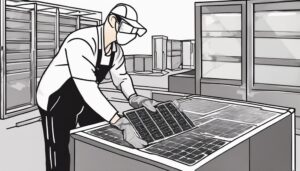Just as a speck of dust can obscure a photographer's perfect shot, even a thin layer of grime on your solar panels can significantly diminish their efficiency. If you've invested in solar technology, you're likely wondering how much it'll cost to keep them clean and running at peak performance. Whether you're considering rolling up your sleeves for a do-it-yourself project or hiring professionals, several factors will influence the price. From the safety risks involved to the environmental impacts of various cleaning methods, there's a lot to consider. Stick around to explore the nuances of maintaining your solar investment efficiently and cost-effectively.
Key Takeaways
- Cleaning costs vary by system size, location, and frequency, impacting overall pricing.
- Professional cleaning ensures safety and efficiency but may cost more than DIY methods.
- Regular maintenance can prevent a 5% to 25% loss in energy output due to dirt accumulation.
- Local cleaning services offer tailored solutions and can efficiently address specific environmental challenges.
Understanding Cleaning Costs
Understanding the costs involved in cleaning your solar panels is crucial, as they can vary significantly based on several factors including the size of your system, its location, and the frequency of cleaning required. It's essential to grasp that the cost variables aren't just about the number of panels you have, but also about accessibility and the specific environmental conditions they're exposed to. For instance, panels located in areas with high dust levels or bird activity may need cleaning more often, influencing the cleaning frequency and thus the cost.
Additionally, the size of your solar panel system plays a pivotal role. Larger systems with more panels naturally incur higher cleaning costs due to the increased labor and time required. The location of your panels, whether on the ground or roof, can also impact the price, as roof-mounted systems often present more challenges and safety concerns, potentially raising the cost.
When considering cleaning frequency, it's not just about keeping your panels looking good; it's about maintaining their efficiency. Accumulated dirt and debris can significantly reduce their effectiveness. Regularly scheduled cleanings, while an added expense, ensure that your system operates optimally, protecting your investment in the long run.
DIY Vs. Professional Cleaning
While considering the costs associated with keeping your solar panels clean, it's crucial to weigh the benefits and drawbacks of DIY versus hiring a professional cleaning service. Making an informed decision depends on a variety of factors, including cleaning frequency and equipment choices.
Here's a breakdown to help you decide:
- Cleaning Frequency: Professionals can assess and recommend a cleaning schedule based on your location and the panels' exposure to dirt and debris. DIY cleaning might miss these nuances, potentially affecting your panels' performance.
- Equipment Choices: Professional services have access to high-quality equipment and cleaning solutions designed specifically for solar panels. In contrast, DIY cleaning requires you to invest in or rent this equipment, which can be costly and less effective.
- Safety Concerns: Climbing onto your roof to clean solar panels poses significant risks. Professionals are trained and equipped to handle these dangers, reducing the risk of injury.
- Guaranteed Results: Professional cleaners often guarantee their work, offering peace of mind that your panels will perform optimally. DIY efforts lack this assurance, potentially leading to suboptimal cleaning results.
Considering these factors can help you make an informed decision that balances cost, effectiveness, and safety.
Maintenance and Efficiency
Maintaining your solar panels through regular cleaning is crucial for optimizing their efficiency and prolonging their operational life. Dust, bird droppings, and other debris can significantly reduce your system's performance. In fact, studies have shown that unclean panels can suffer from a 5% to 25% decrease in energy output. Therefore, understanding the right cleaning frequency is essential for maximizing efficiency impact.
The optimal cleaning schedule varies based on your location and environment. For instance, if you're in a dusty area or have frequent bird visits, you'll need to clean your panels more often than someone living in a cleaner, suburban environment. A general recommendation is to inspect your panels bi-annually and clean them at least once a year. However, monitoring your solar output can help you identify a drop in efficiency, signaling it's time for a clean.
Using the correct tools and methods for cleaning is also vital. Soft brushes or a leaf blower can remove loose debris without scratching the panels, while a gentle, soapy water solution can tackle grime. Remember, the goal is to maintain peak efficiency without causing damage. Regular, careful cleaning ensures you're getting the most out of your solar investment, both in energy production and in extending the lifespan of your panels.
Safety and Environmental Considerations
When cleaning your solar panels, it's crucial to consider both safety and environmental impacts to ensure you're not causing harm while aiming for peak efficiency. The process involves more than just removing dust and debris; it's about preserving the environment and safeguarding personal well-being. Here are key considerations:
- Chemical Hazards: Avoid using harsh chemicals that can run off and harm the surrounding soil and water sources. Opt for eco-friendly, biodegradable cleaning agents that do not pose a risk to the environment or your health.
- Water Usage: Be mindful of the amount of water used. Excessive water can not only lead to waste but also potentially damage the solar panel systems or contribute to erosion and other environmental issues if not managed properly.
- Wildlife Impact: The cleaning process should not disrupt local wildlife. Loud noises, sudden movements, and chemical runoff can all negatively affect nearby animals. Choose methods that minimize disturbance.
- Safe Practices: Prioritize safety to prevent accidents. This includes using proper ladder techniques, wearing non-slip shoes, and ensuring that all electrical components are properly handled to avoid shocks.
Finding Local Cleaning Services
One should consider reaching out to local cleaning services for professional maintenance of solar panels, ensuring efficiency and safety without compromising environmental standards. Service localization plays a crucial role in this context. Opting for local providers not only reduces the carbon footprint associated with travel but also ensures that the service is tailored to the specific environmental conditions and requirements of your area. This local insight can be invaluable, especially when dealing with unique climatic challenges that may affect the performance of your solar panels.
When embarking on your search for the right service provider, quality assessment should be at the forefront of your criteria. It's essential to vet potential services thoroughly. Look for companies with positive reviews, relevant certifications, and a track record of professionalism. Don't hesitate to ask for references or case studies demonstrating their expertise and results. Remember, the goal is not just to clean your solar panels, but to do so in a way that prolongs their life and maximizes their efficiency. By prioritizing service localization and rigorous quality assessment, you'll ensure your solar panels are in capable hands, contributing to their optimal performance and your peace of mind.
Conclusion
In conclusion, keeping your solar panels clean is essential for maintaining their efficiency and longevity. Whether you opt for a DIY approach or hire professionals, it's vital to weigh the costs, benefits, and safety implications. Regular maintenance not only ensures optimal performance but also safeguards your investment. By considering local cleaning services, you can find a solution that aligns with environmental considerations and your specific needs. Remember, the right care can significantly impact your solar panels' effectiveness and durability.



